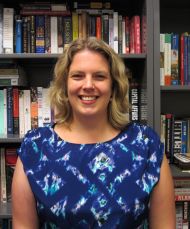Associate professor of history Alison Abra, Ph.D., gave the 2019 Mississippi Humanities Council Teacher of the Year Lecture on Tuesday, March 19 in LAB room 108.
Giving the lecture was a part of winning the Mississippi Humanities Council Teacher of the year award, which was given to Abra as a result of her excellence as an educator as well as a researcher. Before she received the award, Eric Tribunella, Ph.D., an English professor at Southern Miss, talked about Abra’s accolades and achievements.
“[Abra] completed her Ph.D. at the University of Michigan in Ann Arbor and her first book, ‘Dancing in the English style: Consumption, Americanization, and national identity in Britain, 1918-50,’ was published by Manchester University Press in 2017,” Tribunella said. “She is currently working on a book that will be titled ‘Love and War: An Emotional History of British Espionage During World War 2’ and today she is giving a presentation titled ‘Overlooked No More: Women’s History in the Classroom and Beyond’ which is perfectly timed for Women’s History Month.”
Stuart Rockoff, Ph.D., the executive director of the Mississippi Humanities Council then gave a short speech about the Teacher of the Year award before presenting it to Abra. He said that the purpose of the award is to encourage innovative teachers in the humanities and to encourage public education.
“We at the Mississippi Humanities Council believe that it is important to recognize the excellence of humanities teachers while also encouraging their work as scholars,” Rockoff said. “The purpose of this lecture is to show how the insight to the humanities can be shared with the larger public. This is something that Southern Miss School of Humanities and the Dale Center do a wonderful job at: being public humanities scholars.”
At the beginning of her lecture, Abra talked about her philosophy around teaching women’s history and how she tries to have a balance between making women a central part of historical events and avoiding making women seem separate and disconnected from the big events of history.
“It can be a challenge to negotiate a balance between making women an essential part of the historical narrative but also avoiding ghettoizing their experiences,” Abra said. “While I have described these issues as tensions or challenges, I believe that they are productive ones, and they are the ones that I continue to think about as I teach women’s history”
In the rest of the lecture, Abra discussed her current research, which focuses around a World War 2 era espionage group known as the Special Operations Executive, which sent operatives into cover into territories controlled by the Axis Powers, about 40 of whom were women. She highlighted that this recruitment not only went against gender norms but also that the skills of these women provided vital intelligence to the Allies as they prepared for the D-Day Invasion.
She closed the presentation by reflecting on the way that these women’s stories have been told, and that this telling has, in the past, been manipulated to reinforce traditional gender roles. She tied this into how we should go about revisiting moments in history in order to truly consider the immense role that women played in them.
“Restoring women’s history is not always a straightforward process,” Abra said. “We can seek out the roles of women and sort of stir them back in, but we also need to consider why they were overlooked in the first place…in this way, we humanities scholars need to be aware that the act of remembering and forgetting is one that is often shaped by gender.”
photo courtesy usm.edu

























